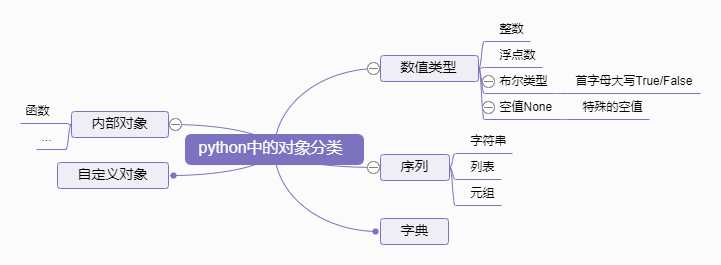标签:表达 声明 数据 port vim 函数名 ack and hello
变量以及类型
变量:存储程序运行中的数据,变量有3个要素:变量名、变量类型、变量值。python属于弱类型语言,不需要声明变量类型。
[root@localhost python]# ipython3 In [1]: a=1 //变量名=变量值;在堆内存中的一个区域存了一个值为1,内存分为堆内存和栈内存,栈内存的是引用。指向堆内存中的值。 In [4]: b=88 In [5]: c=a+b In [7]: c Out[7]: 89 In [8]: a Out[8]: 1 In [9]: type(a) Out[9]: int In [10]: type(c) Out[10]: int In [11]: str="hello" In [12]: str Out[12]: ‘hello‘ In [13]: x,y=1,2 In [14]: x Out[14]: 1 In [15]: y Out[15]: 2 In [16]: In [16]: type(str) Out[16]: str
变量类型

标识符:自定义的一些符号和名称,标识符是自己定义的,如变量名、函数名等。
规则:由字母、下划线和数字组成,且不能以数字开头;不能包含一些有特殊意义的符号,如#.&!()等;同时区分大小写。
大小写规则:
驼峰命名法:如小驼峰:userName / userLoginFlag 大驼峰:UserName;类的名字一般首字母大写。
下划线规则:user_name user_login_flag
保留字/关键字:在计算机中有特殊含义的单词。
In [1]: import keyword In [2]: keyword.kwlist Out[2]: [‘False‘, ‘None‘, ‘True‘, ‘and‘, ‘as‘, ‘assert‘, ‘break‘, ‘class‘, ‘continue‘, ‘def‘, ‘del‘, ‘elif‘, ‘else‘, ‘except‘, ‘finally‘, ‘for‘, ‘from‘, ‘global‘, ‘if‘, ‘import‘, ‘in‘, ‘is‘, ‘lambda‘, ‘nonlocal‘, ‘not‘, ‘or‘, ‘pass‘, ‘raise‘, ‘return‘, ‘try‘, ‘while‘, ‘with‘, ‘yield‘] In [3]:
输出和输出格式
普通的输出,print()
In [4]: print(‘hello‘,‘world‘,‘zyj‘,‘hello‘) //输出多个变量 hello world zyj hello In [5]: print(111+222) //输出表达式 333 In [6]: exit [root@localhost python]#vim 3.py 1 a=35 2 print("my age is:%d"%a ) //变量替换 [root@localhost python]# python3 3.py my age is:35 [root@localhost python]#vim 3.py 1 a=35 2 b=10 3 print("my age is:%d"%a+b) [root@localhost python]# python3 3.py Traceback (most recent call last): File "3.py", line 3, in <module> print("my age is:%d"%a+b) //错误行 TypeError: must be str, not int //错误类型 [root@localhost python]#vim 3.py 1 a=35 2 b=10 3 print("my age is:%d"%(a+b)) //表达式需要用括号括起来 [root@localhost python]# python3 3.py my age is:45 [root@localhost python]#vim 3.py 1 a=35 2 b=10 3 my_name="zyj" 4 print("my age is:%d,my name is:%s" %(a+b,my_name)) //如果需要多个变量替换也要加小括号,并且每个变量用逗号隔开,%d代表整数类型替换,%s代表所有的类型变量替换,可以只记住%s [root@localhost python]# python3 3.py my age is:45,my name is:zyj
[root@localhost python]#vim 3.py money=2 print("I have money:%4d",%money) //输出为4位,默认位空格 [root@localhost python]# python3 3.py I have money: 2 [root@localhost python]#vim 3.py money=2 print("I have money:%04d" %money) //不够4位前面用0填充 [root@localhost python]# python3 3.py I have money:0002
标签:表达 声明 数据 port vim 函数名 ack and hello
原文地址:https://www.cnblogs.com/zhaoyujiao/p/8987342.html